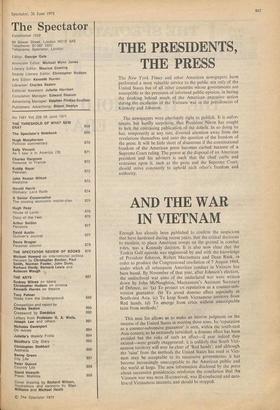AND THE WAR IN VIETNAM
Enough has already been published to confirm the suspicions that have hardened during recent years, that the critical decisions to escalate, to place American troops on the ground in combat roles, was a Kennedy decision. It is also now clear that the Tonkin Gulf episode was engineered by and with the knowledge of President Johnson, Robert Macnamara and Dean Rusk, in order to produce the Congressional resolution of 7 August 1964, under which all subsequent American conduct in Vietnam has been based. By November of that year, after Johnson's election, the undisclosed war aims of the undeclared war were written down by John McNaughton, Macnamara's Assistant Secretary of Defence, as: `(a) To protect us reputation as a counter-sub- version guarantor. (b) To avoid domino effect especially in South-east Asia. (c) To keep South Vietnamese territory from Red hands. (d) To emerge from crisis without unacceptable taint from methods.'
This neat list allows us to make an interim judgment on the success of the United States in meeting these aims. its 'reputation as a counter-subversive guarantor' is seen, within the south-cast Asia context, to be extremely tarnished; a domino effect has been avoided but the risks of such an effect—if ever indeed they existed—were greatly exaggerated; it is unlikely that South Viet- namese territory will ever be clear of 'Red hands'; and although the 'taint' from the methods the United States has used in Viet- nam may be acceptable to its successive governments, it has become increasingly unacceptable to the American public and the world at large. The new information disclosed by the press about successive presidencies reinforces the conclusion that the Vietnam war was most ill-conceived, was ill-conducted and care- less of Vietnamese interests, and should be stopped.






 Previous page
Previous page